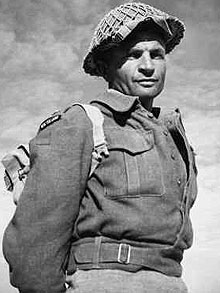Charles Upham
| Charles Hazlitt Upham | |
|---|---|

Charles Upham in NZ field uniform
|
|
| Nickname(s) | Pug |
| Born |
21 September 1908 Christchurch, New Zealand |
| Died | 22 November 1994 (aged 86) Christchurch, New Zealand |
| Allegiance | New Zealand |
| Service/branch | New Zealand Military Forces |
| Years of service | 1939–45 |
| Rank | Captain |
| Unit | 20th Battalion |
| Battles/wars |
Second World War |
| Awards | |
| Other work | Sheep farmer |
Second World War
Charles Hazlitt Upham, VC & Bar (21 September 1908 – 22 November 1994) was a New Zealand soldier who earned the Victoria Cross (VC) twice during the Second World War: in Crete in May 1941, and at Ruweisat Ridge, Egypt, in July 1942. He was the most recent of only three people to receive the VC twice, the only one to receive two VCs during the Second World War and the only combat soldier to receive the award twice. As a result, Upham is often described as the most highly decorated Commonwealth soldier of that war, as the VC is the Commonwealth's highest award for gallantry in the face of the enemy.
Upham was born at 32 Gloucester Street in central Christchurch on 21 September 1908, the son of John Hazlitt Upham, a lawyer, and his wife, Agatha Mary Coates. He boarded at Waihi School, near Winchester, South Canterbury, between 1917 and 1922 and at Christ's College, Christchurch, from 1923–27. He attended Canterbury Agricultural College (now known as Lincoln University) where he earned a diploma in agriculture in 1930.
He worked first as a sheep farmer, later as manager, and then valuing farms for the New Zealand government. In 1937, he joined the Valuation Department as assistant district valuer in Timaru. The following year, he became engaged to Mary (Molly) Eileen McTamney (a distant relative of Noel Chavasse, VC and Bar). In 1939, he returned to Lincoln to complete a diploma in valuation and farm management.
In September 1939, Upham enlisted in the 2nd New Zealand Expeditionary Force (2NZEF) at the age of 30, and was posted to the 20th Canterbury-Otago Battalion, part of the New Zealand Division. Despite the fact that he already had five years experience in New Zealand's Territorial Army, in which he held the rank of sergeant, he signed on as a private. He was soon promoted to temporary lance corporal, but initially declined a place in an Officer Cadet Training Unit (OCTU). In December, he was promoted to sergeant and a week later sailed for Egypt. In July 1940, he was finally persuaded to join an OCTU.
...
Wikipedia
